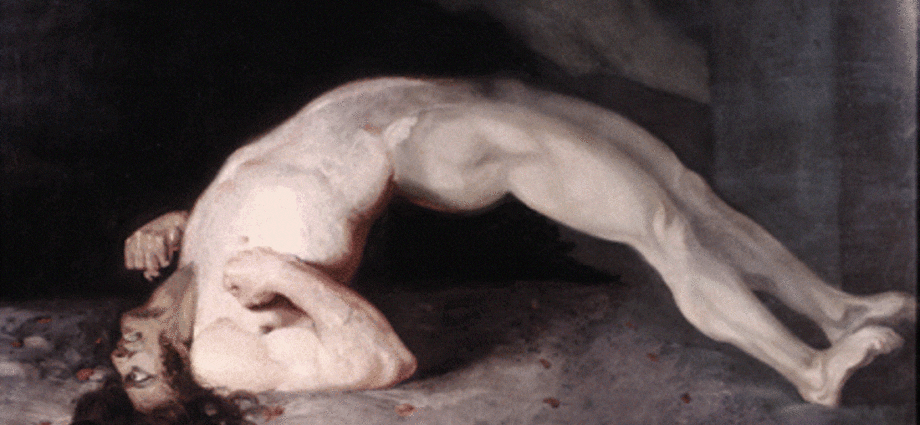Contents
Opisthotonos: definition and particular case of the baby
Opisthotonus is a generalized contracture of the posterior muscles of the body, which forces the body to arch strongly, head thrown back and limbs in hyperextension. This pathological attitude is found in several diseases affecting the nervous system.
What is opisthotonos?
The opisthotonos can be compared to the position in an arc of a circle taken, in classical paintings, by people possessed by the devil.
The posterior muscles of the body, especially the back and neck, are so contracted that the body hyperextends itself, resting on its layer only by the heels and head. The arms and legs are also extended and rigid. This pathological, painful attitude is not controlled by the patient.
What are the causes of an opisthotonos?
Opisthotonos is found in several pathologies affecting the nervous system, in particular:
- tetanus: after an injury, spores of the bacteria Clostridium tetani enter the body and release a neurotoxin, which in a few days causes progressive tetany of the muscles of the body. Quickly, the patient complains of having difficulty in articulating, his jaws are blocked. Then his neck stiffens, then the whole body contracts. If the infection is not taken care of in time, the person cannot breathe and dies. Fortunately, thanks to the compulsory vaccination of infants against tetanus, introduced in 1952, the disease has almost disappeared in France. But it still affects a few people each year who are not vaccinated or who are not up to date with their reminders;
- psychogenic crises non-epileptics (CPNE) : they can make you think of epileptic seizures, but they are not related to the same brain abnormalities. Their causes are complex, with neurobiological components (predisposition of the brain to react in this way) but also psychopathological. In many cases, there is a history of head trauma or post-traumatic stress disorder;
- isolated epileptic seizures, caused by a head injury or a neuroleptic drug, can manifest as such;
- rabies, in rare cases;
- acute and severe hypocalcaemia : a very abnormally low level of calcium in the blood is often linked to a problem with the parathyroid glands, responsible for regulating the availability of this mineral in the body;
- brain pain : inflammation caused by certain meningitis, destruction of brain tissue by encephalopathy, or even pathological involvement of the tonsils in the cranial box, can result in opisthotonos.
Special case of opisthotonos in babies
At birth, midwives routinely assess the infant’s muscle tone. Through various maneuvers, they can spot excess contraction of muscles in the back of the body. If they don’t report an anomaly, all is well.
If the mother is not vaccinated against tetanus, and opisthotonus appears soon after birth, associated with inability to suckle and a characteristic smirk of the face, neonatal tetanus should be suspected. The situation is more likely to be found in countries where there is no vaccination coverage against this disease, and where the conditions of childbirth are not sterile.
Subsequently, it often happens that the baby adopts a position of opisthotonos to express unstoppable anger: he rears up and arches backwards in an impressive way, because of his great flexibility. If it is temporary and if its limbs remain mobile, it is not pathological. On the other hand, you can talk to the pediatrician about it: this attitude can also express a strong pain, related for example to an important gastroesophageal reflux and acid.
If the tetanus attacks persist or are repeated, with a body so stiff that it could almost be held only by the head and feet, and hyperextended limbs, it is a medical emergency, related to pain in the body. brain. We can be faced with:
- infant meningitis ;
- shaken baby syndrome ;
- neonatal hypocalcemia ;
- maple syrup urine disease : this rare genetic disease (less than 10 cases per 1 million births) has a poor prognosis if it is not taken care of in time. It is characterized by a smell of maple syrup in the earwax and then the urine, feeding difficulties, lethargy and spasms. If left untreated, it is followed by progressive encephalopathy and central respiratory failure. Treated on time, it is viable but requires a strict diet for life;
- some forms of Gaucher disease : type 2 of this rare genetic disease manifests itself in the first months of the infant, initially by horizontal oculomotor paralysis or bilateral fixed strabismus. It very quickly evolves into progressive encephalopathy, with severe breathing and swallowing disorders, and opisthotonos attacks. This pathology has a very poor prognosis.
What can be the consequences of an opisthotonus?
An opisthotonus, whatever it is, must lead to a consultation. As seen above, it can reveal a serious, and potentially fatal, pathology of the nervous system.
This generalized spasm, because it causes the patient to fall suddenly, can also cause physical injuries: he can involuntarily injure himself on the floor or against a piece of furniture while falling. In addition, the contractions of the back muscles are sometimes such that they can cause spinal compression.
What treatment for opisthotonos?
The treatment of the tetanus crisis includes powerful sedatives, even curariants (drugs having the paralyzing properties of curare), to fight the contracture.
When possible, the disease in question is treated. His other symptoms are also taken care of. Thus, in case of tetanus, sedatives are combined with artificial respiration after tracheotomy to combat asphyxia, while the antibiotics take effect.










